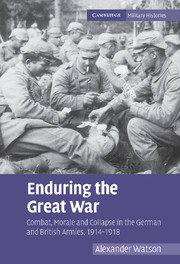Book contents
- Frontmatter
- Contents
- List of plates
- List of figures
- List of tables
- Acknowledgements
- List of abbreviations
- Map: The Western Front 1914–1918
- Introduction
- 1 War of endurance
- 2 Why men fought: combat motivation in the trenches
- 3 Self-deception and survival: mental coping strategies
- 4 Junior leadership: command, cohesion and combat motivation
- 5 Morale and military endurance
- 6 The German collapse in 1918: strike, mutiny or an ordered surrender?
- Conclusion
- Appendix 1 Walter Ludwig's study of Württemberg soldiers' coping strategies
- Appendix 2 Psychiatric casualties in the German and British armies
- Appendix 3 Military ranks and status in the German and British armies
- Glossary of German terms
- Bibliography
- Index
4 - Junior leadership: command, cohesion and combat motivation
Published online by Cambridge University Press: 05 February 2014
- Frontmatter
- Contents
- List of plates
- List of figures
- List of tables
- Acknowledgements
- List of abbreviations
- Map: The Western Front 1914–1918
- Introduction
- 1 War of endurance
- 2 Why men fought: combat motivation in the trenches
- 3 Self-deception and survival: mental coping strategies
- 4 Junior leadership: command, cohesion and combat motivation
- 5 Morale and military endurance
- 6 The German collapse in 1918: strike, mutiny or an ordered surrender?
- Conclusion
- Appendix 1 Walter Ludwig's study of Württemberg soldiers' coping strategies
- Appendix 2 Psychiatric casualties in the German and British armies
- Appendix 3 Military ranks and status in the German and British armies
- Glossary of German terms
- Bibliography
- Index
Summary
Function and influence
Although patriotism, rational self-interest and natural resilience go far in explaining why and how Germans and Britons fought for so long, armies' impressive records of endurance cannot be understood without reference to junior officers. Examinations of troops' battlefield behaviour and discipline have erred by ignoring or underestimating the importance of these men: Tony Ashworth, for example, misinterprets command relations during the First World War as a direct struggle between other ranks and army staff rather than as a relationship mediated by junior officers. Although identified with the army command in the rear by their commission or Patent, they were also united with combat soldiers by means of shared danger and deprivation. Psychological and sociological research has emphasised the great influence provided by this intermediary position. S.A. Stouffer's study of the American army between 1941 and 1945, for example, found that ‘men's attitudes toward their officers had a real importance in determining whether men fought aggressively and stayed in the fight’. Morris Janowitz and Edward A. Shils similarly concluded from their examination of the Second World War Wehrmacht that soldiers' obedience and combat motivation ‘depended upon the personality of the officer’.
- Type
- Chapter
- Information
- Enduring the Great WarCombat, Morale and Collapse in the German and British Armies, 1914–1918, pp. 108 - 139Publisher: Cambridge University PressPrint publication year: 2008



